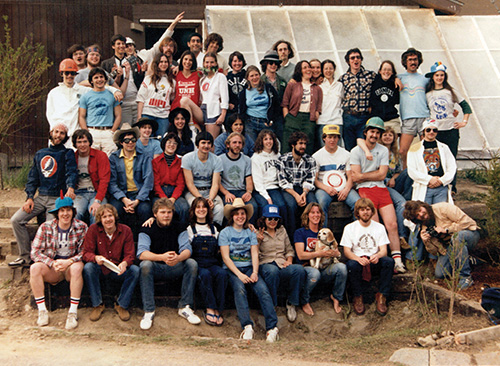
UNH SUSTAINABILITY FACTS: 1. The UNH Sustainability Institute is the oldest endowed university sustainability program in the United States; 2. UNH is a USA Today national top-10 place to study natural resources and conservation; 3. UNH is ranked second in the country by the Ecological Society of America for the study of ecology; 4. EcoLine went online in 2009 and today provides 85 percent of campus energy from landfill gas; 5. The UNH-developed SIMAP is used by 1,000 U.S. college campuses to measure their carbon and nitrogen footprints
Take a walk through campus and it’s easy to get lost in UNH’s natural beauty. Tree-lined sidewalks border burbling streams and wander over gently rolling hills and past jutting rocks. In the silence of a winter snowfall or the glow of a blazing summer sunset, the campus is inviting.

A Brief History of Sustainable Living at UNH
Sustainable living was a thing at UNH as far back as the 1930s, when a group of students built cabins in woodlands owned by forestry professor Karl Woodward, where they heated and cooked with woodstoves and lived rent-free. In 1974, the Thompson School and the UNH student housing office launched a joint project that took that same concept a step further, creating a completely self-sustainable student farm. Called Highland House, the off-campus farm included a nursery, Christmas tree farm and orchard; students raised beef and grew vegetables, cut cordwood, made maple syrup and did all their own cooking and baking. Two years later, UNH debuted a minidorm devoted to the environment, Woodruff House, to which its 50 resident students soon added solar panels, a solar hot-water heater and a southern-exposure greenhouse to generate heat. Woodruff residents also organized an energy-saving competition among the minidorms and were behind the first campus “Sun Day,” in 1978 — the same year 45 Thompson School students enrolled in the university’s new energy management program. The first of its kind in the nation, the program taught students to evaluate existing energy systems and calculate the cost savings of alternative conservation methods.
In that invitation is a question, a challenge to be sustainable: How do we want to leave the world?
“One of the features we have going for us is the natural beauty of the university,” says Heidi Bostic, dean of the College of Liberal Arts. “It uplifts us and reminds us of the fragility of life and the importance of being good stewards.”
Because that question is built into the landscape itself, the idea and practice of sustainability rests in everything UNH does. For faculty, staff and students, sustainability isn’t a passing fad or window dressing. It’s an ongoing practice so central to the university’s identity that, without it, UNH simply wouldn’t be UNH.
Deep roots
It’s impossible to talk about sustainability at UNH without talking about the Hubbard family. Oliver Hubbard ’21 and his brothers, Austin ’25 and Leslie ’27, parlayed their UNH education into a massively successful poultry business. In later years, their focus turned to philanthropy, and Oliver’s particularly to sustainability. A series of gifts from the eldest Hubbard in the 1990s resulted in the endowment that launched the Sustainability Institute and established the Climate Change Research Center, among many other programs.
Peter Lamb ’76 was part of the team of UNH staff members who facilitated Oliver Hubbard’s gifts. At the time, “we were trying to think about how to connect some of the natural resource-based sustainability principles that were coming out of COLSA, but also how to live what we teach — how the whole campus could really embrace these principles,” Lamb says.
Oliver Hubbard helped make that possible. With the gift, UNH became the first university with an endowed sustainability program. “The Hubbards were out in front of the horizon. Rather than waiting for something to be put in place and support it, they were and are the kind of people who continue to help UNH evolve and remain on the cutting edge. That’s the way they ran their business, and it’s part of their legacy here,” Lamb says.


Yes, sustainability means recycling and renewable energy. But it’s also campus culture, inclusivity, interdisciplinarity — and much more
Sustainability runs like a current through UNH, continually shaping our approach to education, research and practice. It is one of the university’s core values, helping to define UNH’s culture and informing our behavior, and is a guiding principle in everything we do. As a land, sea and space grant university, we use a community-based approach to learning and a systems approach to solving problems. This is evident in our longstanding dedication to the meaningful creation of knowledge and our shared investment in our accomplishments.
The 1992 Earth Summit was an unprecedented global gathering of heads of state and representatives from more than 170 governments, including the United States, that reoriented international development to include principles of environmental stewardship, social responsibility and economic vitality to meet the needs of present and future generations. As recently as 2000, the term sustainability was understood to mean “meeting present needs without compromising the ability of future generations to meet their needs.” Today, UNH and others in the field view sustainability as a collective commitment to human dignity for all people and ecological integrity in all places. Its foundation is an intergenerational, ethical obligation that regards social justice, collaboration and inclusive prosperity as essential to fulfill diverse human potential and preserve the health of the planet upon which we all depend. There’s a growing understanding that sustainability is much more than environmentalism, rooted as it is in leveraging economics, culture, resources and technology to plan for an uncertain future.
The challenges we face are daunting — climate change, ecosystem degradation, food insecurity, destabilized governments, racial and economic inequality and more. At UNH, we believe that if we harness the power of our community to answer the call of these extraordinary times, our impact will be significant and proportional to the transformation needed. To do so, we must recast challenges as opportunities to find common cause and work collectively toward a vibrant future.
Connecting the dots
That core commitment to sustainability is part of the university’s infrastructure. It’s everywhere, from student organizations to large initiatives like the Responsible Governance and Sustainable Citizenship Project (RGSCP), and from small projects like capturing unused mechanical energy in university facilities to massive undertakings such as the goal of making Wildcat Stadium a zero-waste facility.
The Sustainability Institute sits at the center of a web of connections across campus. The institute doesn’t oversee every project, course or program that involves sustainability — there are so many that it would be impossible — but it does convene, cultivate and champion conversations about sustainability on campus, throughout New Hampshire and around the world.
Those conversations happen informally and formally, in laboratories and dorms and regular meetings of the institute’s various task forces. The task forces approach sustainability from myriad angles, looking at transportation policy, energy, campus aesthetics, the ecosystem, zero-waste initiatives and sustainable investing.
“The challenge is to make sure we’re connecting the dots between the disparate conversations and helping create and enhance the alignment between different task forces, which are often quite related,” says sustainability project director Jenn Andrews.
Membership on the task forces is inclusive, with faculty, staff and students all playing a role. In Cameron Wake’s global environmental change class, Wake asks his students to brainstorm ideas about how UNH can continue to reduce its greenhouse gas emissions.
“I get about 12 to 15 of these ideas and then filter them back to the energy task force, so we have students out there thinking about the problem and generating ideas,” he says. “Collaboration is challenging and takes time and effort, but it’s exactly that collaboration we need to drive these cross-campus efforts and make them successful.”
In the classroom and out in the world
The campus also provides fertile ground for sustainability-minded students to pursue their passions. Student groups like the Student Environmental Action Coalition and others offer opportunities to take direct action with events like the annual Trash 2 Treasure yard sale.
Trash 2 Treasure is one of UNH’s enduring sustainability success stories. Started seven years ago by Alex Freid ’13, the sale collects common dorm items discarded at the end of every school year — couches, lamps, microwaves, etc. — organizes them, and offers them for sale when students return for the new academic year. The sale has diverted close to 150 tons of reusable material from landfills, Freid says. And it also formed the basis for the Post-Landfill Action Network, Freid’s national nonprofit that works with more than 100 campuses to develop zero-waste initiatives.
Students are involved in the classroom, too. A recent survey by the Sustainability Institute found that 31 percent of students considered sustainability as a factor when enrolling at UNH. Of the total respondents, 54 percent said sustainability is personally important to them and to their likely career path, while 59 percent indicated they would take courses in sustainability or choose sustainability-related degrees. Academic programs like the sustainability dual major, the sustainable agriculture and food systems program and the ecogastronomy dual major help students chart a path for their own sustainable future.
What About Sustainable Investing?
Sustainability has become an important topic for the UNH Foundation in recent years as a growing body of evidence suggests that sustainable investing can compete on par with an unconstrained portfolio in maximizing returns for the university. To that end, in 2015, the UNH Foundation Board of Directors established an endowment portfolio that takes into account the environmental, social and governance (ESG) characteristics of the funds that comprise it. Donors including Durham philanthropist Tom Haas and foundation board member Ned Dane ’88 have directed their philanthropy to this endowment option, which earned returns very similar to the broader pool for the most recent fiscal year. And just four months ago, the foundation’s investment and finance committee established a committee on investor responsibility that will inform and make suggestions to committee and ultimately the board on sustainable investment and related advocacy opportunities that exist outside investments in the existing ESG endowment option. This new advisory committee includes a variety of alumni, faculty and staff with interest and experience in sustainability, as well as student representatives from the Paul College Atkins Investment Group and DivestUNH, one of UNH’s student environmental advocacy groups. “The committee on investor responsibility is a great development for UNH and the foundation,” says Elizabeth Hilpman ’81, who sits on the UNH Foundation board of directors. “There are so many schools where this isn’t even a real conversation yet, but we’re taking important steps toward making sustainability an everyday part of the investment process. We credit our students for keeping the focus on sustainability, and our board for being receptive to the idea and mindful that sustainability is part of the core mission, and a brand pillar at UNH.”
“Food cuts across agriculture — it includes growing, producing and distributing food; food preparation, selling and serving; and nutrition and health — along with the greater influence of political and social systems on food,” says Dan Winans, director of the ecogastronomy dual major. “The major is an opportunity for students to go further and broaden their understanding of the food system.”
Sustainable systems
Research efforts by faculty across campus are part of that infrastructure. The emphasis on, and enthusiasm for, sustainability is found across disciplines. From Wake’s research on climate change and other projects at the Institute on Earth, Oceans, and Space, the Shoals Marine Lab and other UNH colleges to new sustainability-focused courses in the humanities and social sciences, each project, initiative and group builds on itself.
“We just did a round of funding small grants for designing and redesigning courses to incorporate sustainability,” says Stephen Trzaskoma, professor of classics and director of RGSCP. “There were so many great proposals from different disciplines, and I was particularly struck by how many came from the humanities, and often from unexpected places. I think we’re likely to see more and more faculty finding ways to connect their work to the broader questions that overlap with issues of sustainability.”
Those collaborations extend into the wider community. UNH Cooperative Extension, New Hampshire Sea Grant, Climate Solutions New England and other organizations work with communities in New Hampshire and beyond to develop sustainable responses to climate change, food systems, social justice and hundreds of other issues.
The efforts show no signs of slowing down. “I think we’re considered one of the leaders in sustainability across the country, but I don’t see any of us resting on our laurels. In fact, I see a more aggressive attitude toward sustainability,” says Clay Mitchell, a lecturer with the department of natural resources and the environment and a member of the Sustainability Institute’s energy task force.
The commitment to sustainability is so deep that, at times, it can seem overwhelming. Relax for a moment and take a walk, though, and you’ll see how vital it is.

Read more about the overarching story of sustainability at UNH here:
Originally published in UNH Magazine Fall 2017 Issue
-
Written By:
Larry Clow '12G | UNH Cooperative Extension -
Written By:
Kristin Waterfield Duisberg | Communications and Public Affairs -
Written By:
Colleen Flaherty | UNH Sustainability Institute
















































